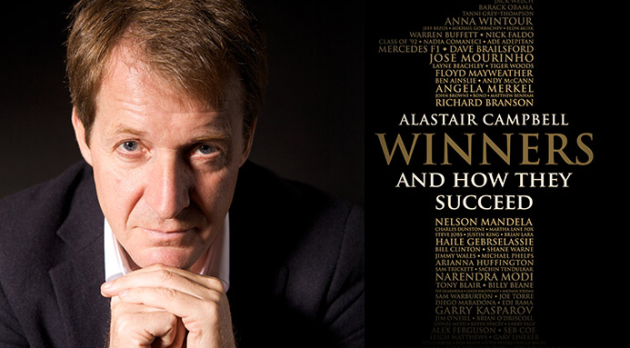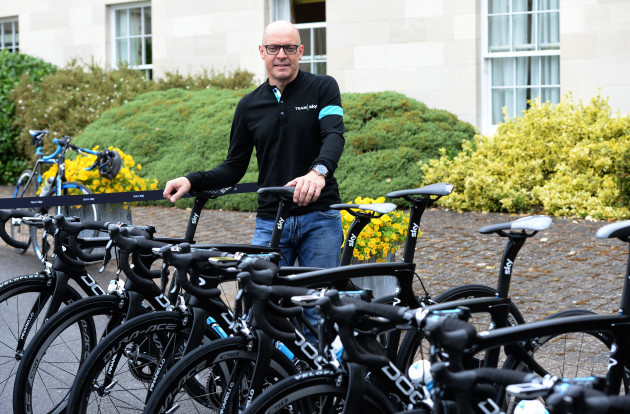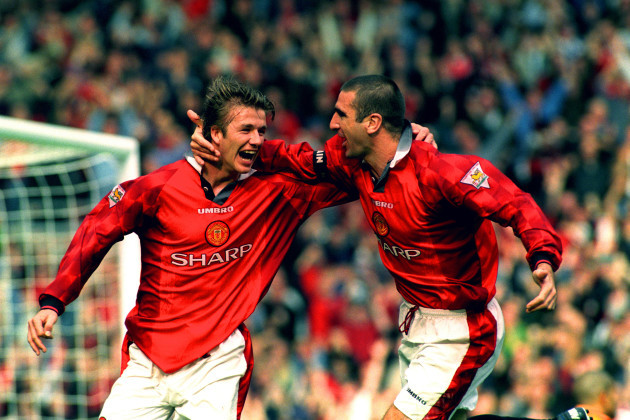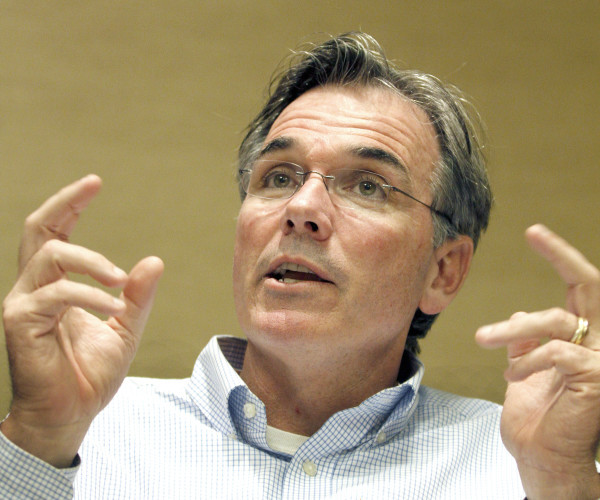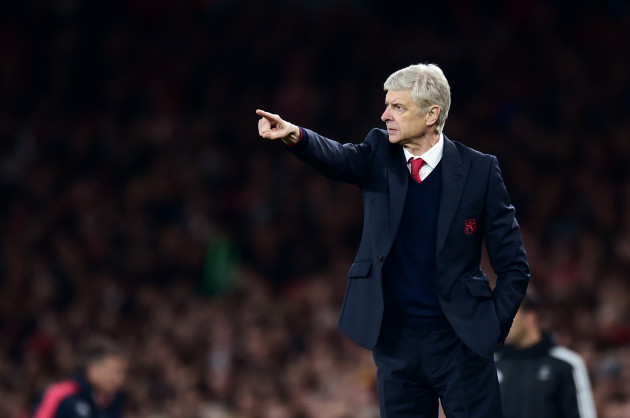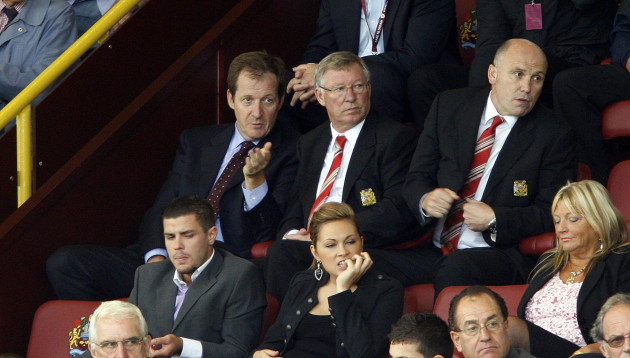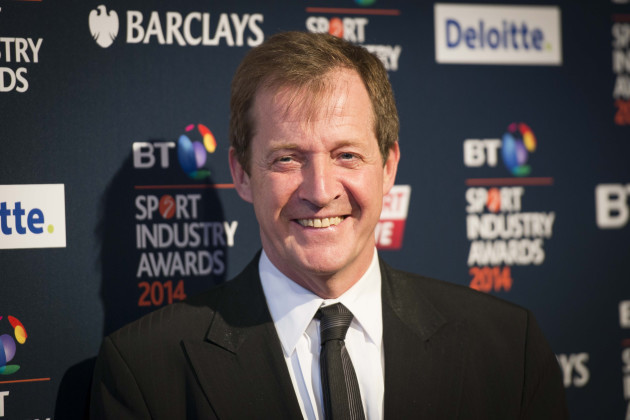THE ST.BRONAGH’s minor football team were in free-fall.
“We’d started off winning games and then we lost to our local rivals and things started to go awry”, says the Down side’s manager Eamonn Devlin.
“We played Carryduff – a game that we should’ve won – and we drew and got ourselves out of jail. We had a meeting afterwards about how how the league was gone and how we were going to prepare for the championship. We gave them a week off and the group of mentors put together our ideas of what we were going to do with the team.”
Devlin already had his inspiration – a copy of ‘Winners’, a book written by Alastair Campbell which contains interviews, anecdotes and advice from a collection of high-profile sports stars, businesspersons and politicians like Jose Mourinho, Richard Branson and The Queen, mixed with personal insight from Campbell himself.
The biggest commonality shared between all of these personalities, according to Campbell, is OST – objective, strategy and tactics. And that’s what Devlin built his new system around.
“The objective was to win the championship – it was about how we were going to get there”, says Devlin.
“I knew we had the players to win the championship. I knew I had the people with me to win a championship. We knew we wanted to play open-style football, 15-on-15, a break from what everybody else was doing. We decided to suit our training to that sort of football. And for every game in the championship, I took a little bit from the book.
For instance, there was this idea of ‘WIN’ – What’s Important Now. It comes from the All Blacks team. If you’ve ever noticed it, they have a technique where they’ll either put their hand down their face or they look up to the sky. And they reset themselves, no matter what has just happened. So, we had that discussion with the players – that would’ve been a theme for one week.
For the next round, it could’ve been ‘T-CUP’ – Thinking Clearly Under Pressure. Because of the packed defences, we had to work on getting clear of them and how to get a score in that situation. In our semi-final, we scored three points in injury time when we had been two points down. That was T-CUP.”
St. Bronagh’s won the Down minor championship this year. Devlin had coached the team all the way up from under-12s and the group had never tasted victory in any competition before.
Feeling indebted to Campbell’s book, he sat down at his computer one night, composed a hugely heartfelt email and sent it to a generic address, never thinking Campbell would see it or respond to it.
Ten minutes later, Devlin’s phone buzzed. In his inbox was an equally-heartfelt response from Campbell and a friendship began.
They met for the first time in Dublin, a rendezvous this author gatecrashed to learn more about the art of winning.
“Winning is really complicated”, Campbell tells The42.
“(Performance director of British Cycling and manager of Team Sky) Dave Brailsford is a big OST man and was talking recently about winning the Tour de France. Now that is really, really complicated. His objective was to win the Tour. But he said that he set that objective before he worked out how to do it. His strategy was working out everything he needed to do to win. Then his tactics were the doing – you’ve got to get money, the right riders, the right kit. He phoned me up once and said ‘What was the best bus you were ever on during a campaign?’ It was about attention to detail. His riders would spend a lot of time on the bus so he wanted to make it special.”
Campbell does acknowledge that a coach or manager needs to know their audience. Where some may instantly adapt to a new system or buy into a different way of doing things, others can treat it with suspicion. Winners understand that everyone is unique.
“Most people, when they’re confronted with the idea of changing, is to say ‘That’s not how we do it’. You take Arsene Wenger coming in as manager of Arsenal and his whole thing of diet and nutrition or Fergie with trying to change the drinking culture at Manchester United – it’s a difficult start. You can only do it through leadership. Fergie says the reason why Eric Cantona was so important wasn’t just because he was a great player but because he was never happy with training and would always demand more and train in the afternoon. And all these other guys – the Gary Nevilles and David Beckhams – came around to that idea of doing more.”
Is success ingrained in someone’s DNA? Were the great minds of today the same in the schoolyard, standing out from the crowd? Are winners born or made?
“I think it’s a bit of both. I don’t think talent is enough. It can take you an awfully long way but there’s that great story from Eric Harrison, the youth team coach at Manchester United, who says the best player he ever had was Raphael Burke – and nobody’s ever heard of him. He says he was the most talented footballer he ever saw. Gary Neville – not a talented footballer – by his own admission – but he made it because he worked hard, got the right people around him and developed.
I think that’s why Wenger doesn’t sign many English players. I think a lot of them think they’ve made it.”
Campbell thinks many winners are fueled by what comes next and that the taste of success, for them, is only ever fleeting.
In ‘The Second Half’, Roy Keane talks of the brief, flickering brightness that followed victory compared to the relentless feeling of failure that accompanied defeat.
“It’s amazing how many of these guys don’t celebrate winning because they’re already focusing on the next one”, says Campbell.
“Brailsford doesn’t really like having parties. He says everyone has a long-term diet and nutrition plan and it affects sleep and that’s just part of his personality. Mourinho – when he threw his Premier League medal in the crowd – I know there’s showmanship involved but I think it’s also his way of saying, ‘Right, on with the next one’.
Sometimes, that ‘next one’ doesn’t quite go according to plan and winners are quickly dismissed by the increasingly demanding and unrealistic short-termism of supporters and other stakeholders.
Winners distance themselves from the hysteria, keeping a keen focus on the strengths and philosophies that have led to their initial success.
Speaking to Billy Beane last year – who is profiled in Campbell’s book – he spoke of ‘ignoring the noise’ of the critics.
“Anytime you’re in a high-profile public business where there’s a lot of passion and emotion surrounding it, you’ve got to ignore all of the noise. Both good and bad. Plenty of times people will want to pat you on the back, just as they’re willing to criticise because of temporary results. No plan interrupted is ever successful. And anytime you get resistance, if you’re willing to listen and give in, you’re probably not going be successful long-term. That’s the biggest challenge if you’re running a club – to ignore that temporary noise that exists when things aren’t perfect.”
After Arsenal were humiliated 8-2 by Manchester United at Old Trafford in 2011, Arsene Wenger went into the dressing room and said nothing of note. There was no roaring or shouting. His players had already suffered enough. Instead, he stuck to his own principles.
Afterwards, he spoke of why it was so crucial not to get swallowed up by the opinions of others at a sensitive and vulnerable time for the club.
“We have gone from a vertical society to a horizontal society where everybody has an opinion about every decision you make, everybody has an opinion on the internet straight away. Basically the respect for people who make decisions is gone because every decision is questioned
So one of the most important qualities of a good leader now is massive resistance to stress. Under stress you become smaller and smaller until you cannot give a message out any more and that, of course, is something that is vital.
That’s the moment that you have to show leadership qualities and show that you are strong and show that you don’t panic.”
Campbell adores Wenger’s outlook on minimising the noise.
“What he’s saying is that when you find yourself surrounded by media shit all of the time, you’ve got to ignore it. You cannot let it affect your strategy.”
It takes me close to an hour before mentioning Campbell’s previous life as a political strategist. For years, he was Director of Communications for Tony Blair. But what about the internal politics of sport and the damage it can cause?
In 2009, Campbell sat down with Ferguson and delivered a fascinating portrait for The New Statesman. In it, Campbell quizzes him on his plans after football and asks, “No chance of going into punditry when you retire, is there?”
Ferguson’s response is intriguing.
“Not a chance. Some of the ex-player, ex-manager pundits are the worst. It’s a disgrace the way they sit there criticising guys they used to play with, just to make a bit of an impact. I couldn’t do that.”
How much does Campbell think the criticisms of former players-turned-analysts influences the performances and behaviour of current squad members?
Immediately, he jumps in. Two-footed, with studs raised.
“Well, Fergie still went and wrote a book and said he only ever had four world-class players, didn’t he?”
Touché.
“But I think it does affect things. Through the book and through working with some of these guys, I’ve come to realise how interesting it is. I remember the Lions tour in 2005 and I remember Matt Dawson getting Man of the Match in one of the games. But he didn’t want to do the interview afterwards because he didn’t like the person doing the interview.
You have some players who will pick up the papers and look at their marks out of ten. ‘Ronaldo – 6. A poor start’. What does the guy writing the ratings know about Ronaldo? But you have some players reading this stuff and saying ‘A 4? I thought I played well’. What matters is what the manager thinks but it has an impact, for sure.
As our chat draws to a close, I ask Campbell about the future. There is his prolific writing career (10 books and counting), his high-profile interviews for GQ and anything else that piques his wide-ranging interest.
Campbell says that he doesn’t want to do anything on a full-time basis anymore but throughout our hour together, he hints at having worked with a number of sports personalities and organisations in an advisory capacity.
“One of the things that depresses me is that sport has more winners in it. It might sound obvious but it shouldn’t. Sport does it better, business does it second-best and politics does it third best and that’s a problem.”
Given his passion for it and his admiration for so many of the people involved at an elite level, could he see himself working in a formal sports role?
“It would have to be…it would have to be real…” He trails off before offering up an inexplicable but brilliant anecdote.
“Remember I got asked if I wanted to do that TV thing?” he says to a friend sitting close by.
I’m expecting him to offer up a tale I read in a previous interview where Campbell revealed he was asked to be part of a television show where he would, in his own words, “become black, through a mixture of make-up and surgery, to ‘expose racism in America’”.
Instead, he serves up something a little less absurd.
“Bainisteoir? I was up for it.”
“Celebrity Bainisteoir?”, I ask – more than a little taken aback.
“Yeah, I just didn’t have the time. The commitment was really, really serious. But I would’ve gone for it though.”
I never asked him if he fancied his chances of winning.
Odds are that he did.
